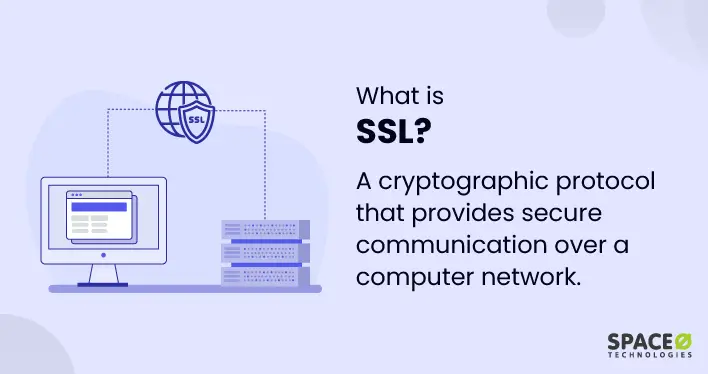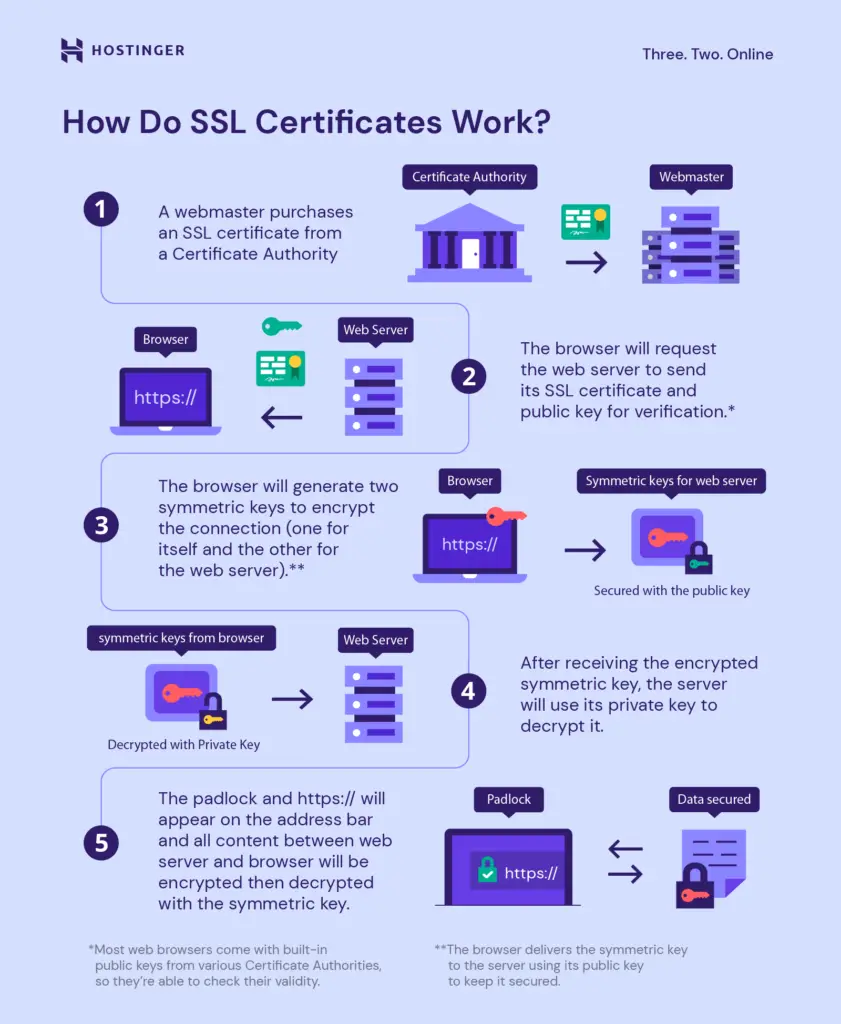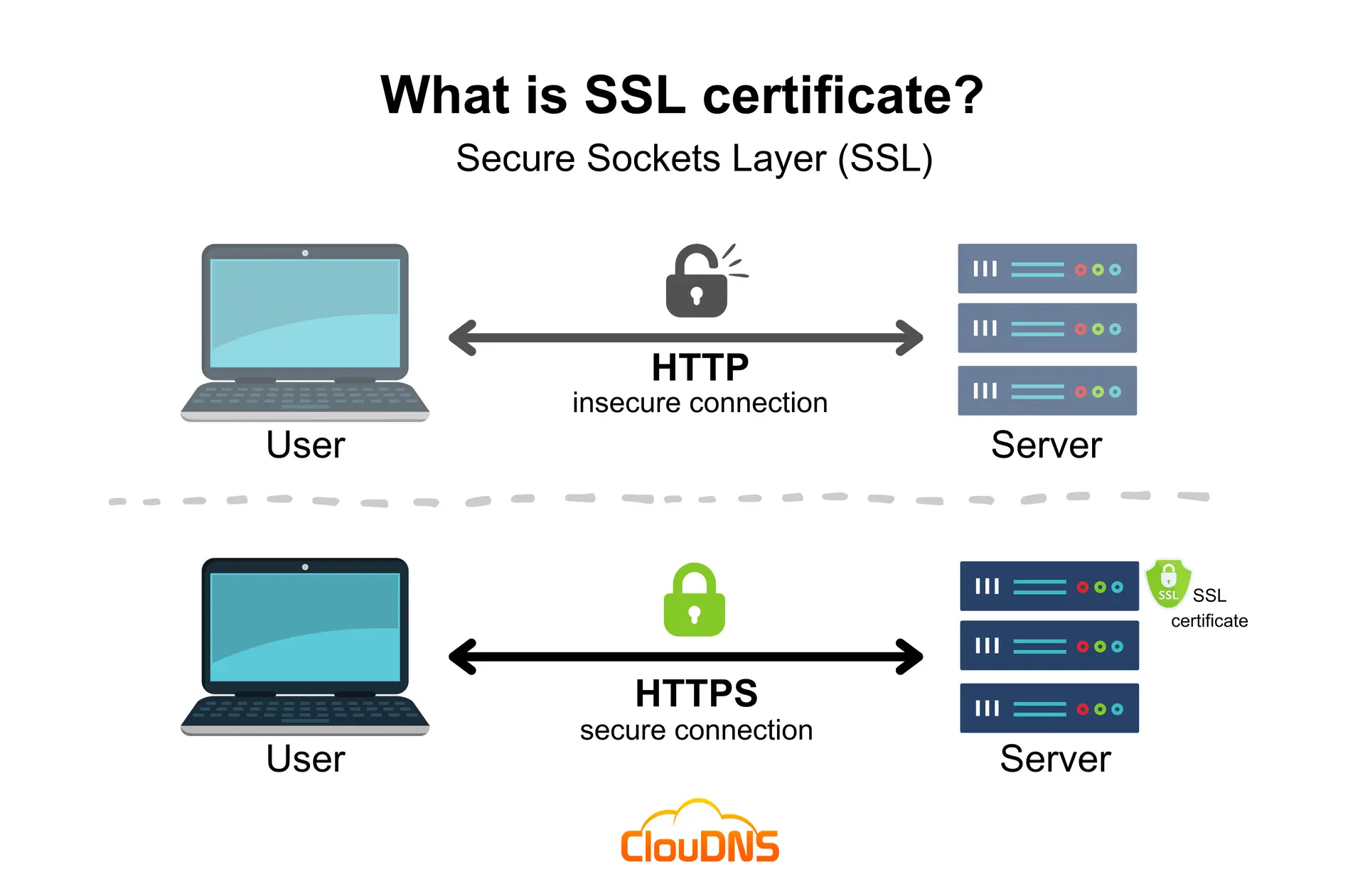SSL, or Secure Sockets Layer, is a communication protocol that encrypts data and authenticates websites to create a secure connection between a user’s device and a website:
Encryption
SSL encrypts data sent between a user’s device and a website, making it nearly impossible for anyone to intercept and read the data.
Authentication
SSL verifies that the website is who it claims to be by initiating an authentication process called a handshake.
Data Integrity
SSL digitally signs data to verify that it hasn’t been tampered with before reaching its destination.
SSL is important for keeping online interactions private and ensuring that users can safely share sensitive information with websites. Websites that use SSL have “HTTPS” in their URL instead of “HTTP”.
SSL was developed by Netscape in 1995, but it has since been replaced by TLS (Transport Layer Security), which offers more robust security and performance. The latest version of TLS is TLS 1.3, which was released in 2018
TLS/SSL
What is SSL and why is it important?
Secure Sockets Layer (SSL) certificates, sometimes called digital certificates, are used to establish an encrypted connection between a browser or user’s computer and a server or website.
SSL: Secure Sockets Layer
SSL is the standard technology for securing an internet connection by encrypting data sent between a website and a browser (or between two servers). It prevents hackers from seeing or stealing any information transferred, including personal or financial data.
TLS: Transport Layer Security
TLS is an updated, more secure version of SSL. We still refer to our security certificates as SSL because it’s a more common term, but when you buy SSL from DigiCert, you get the most trusted, up-to-date TLS certificates.
HTTPS: Hyper Text Protocol Secure
HTTPS appears in the URL when a website is secured by an SSL/TLS certificate. Users can view the details of the certificate, including the issuing authority and the corporate name of the website owner, by clicking the lock symbol on the browser bar.
Benefits of SSL Certificates
Encryption
SSL encrypts information sent between a website and a browser, making it difficult for others to intercept. This protects sensitive data like passwords, credit card information, and contact information.
Authentication
SSL verifies that a website is authentic and that the client is receiving data from the correct server.
Customer Trust
SSL certificates help build trust with users by ensuring their data is secure.
Search Engine Rankings
Google considers HTTPS a ranking factor, so websites with SSL certificates may appear higher in search results.
PCI Compliance
SSL certificates are required to meet Payment Card Industry (PCI) regulations, which allow businesses to accept online payments.
Regulatory Compliance
SSL certificates can help businesses comply with other regulatory standards.
As of January 2024, 82.9% of websites have a working SSL certificate. This is a significant increase from 18.5% in the previous five years.
In short: SSL keeps internet connections secure and prevents criminals from reading or modifying information transferred between two systems. When you see a padlock icon next to the URL in the address bar, that means SSL protects the website you are visiting.


There are several types of SSL certificates, including:
- Wildcard SSL certificate: Secures a root certificate and an unlimited number of subdomains on a single level.
- Multi-domain SSL certificate: Secures multiple domains and subdomains with a single certificate.
- Single domain SSL certificate: Valid for one domain, including both the WWW and non-WWW versions.
- Domain Validation (DV) SSL certificate: A quick and affordable way to achieve industry-standard encryption. DV certificates are the most common type of SSL certificate.
- Extended Validation (EV) SSL certificate: The most elevated type of SSL certificate available. EV certificates enable the green bar in the address bar and make your website instantly recognizable.
- Unified Communications Certificate (UCC): Also known as multi-domain SSL/TLS certificates, UCCs can secure multiple fully qualified domain names (FQDNs) and specified subdomains.
When choosing an SSL certificate, you can consider 4 things like:
- The Type of Website
For example, an eCommerce website might benefit from an EV SSL certificate, while a small personal website might be sufficient with a DV SSL certificate. - The Number of Domains
If you have multiple domains or subdomains, a Multi-Domain or Wildcard SSL certificate might be more cost effective than buying multiple single-domain SSL certificates. - Your Budget
DV SSL certificates are the least expensive, while EV SSL certificates are the most expensive. - Your Technical Expertise
If you’re not comfortable with installing and configuring an SSL certificate, a Managed SSL certificate might be a good option.




